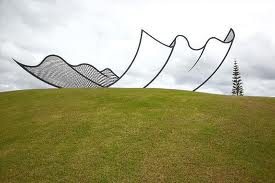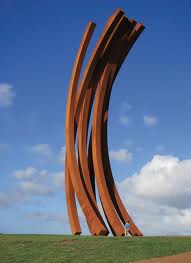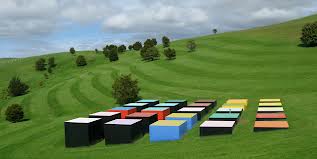Serious Fun
The Life and Times of Alan GibbsPaul Goldsmith
Alan Gibbs is a NZ businessman with an international profile for two reasons:
One, he has a world class sculpture park at his farm on Kaipara Harbour



(Google "Alan Gibbs farm" images to see more)
Two, he is the driving force behind the first practical amphibious car (practical in the sense that it can go fast on both land and water.
amphibious car
amphibious quad ski
In mid 1980's Gibbs drove reform of NZ Forest Service. One of the transforms necessary was to get the waged workers into contract status. So they were offered a choice - they could have a guaranteed job for a year, but with no assurance that there would be one at the end, or, they could have a year's pay as redundancy. Not surprisingly almost everyone took redundancy. Then, schemes were set up to show them how to use the redundancy payout to buy equipment and vehicles to set themselves up as contractors.
More books on Work
Whenever met someone new, whether a taxi driver in New York or a guest in NZ, Gibbs had 3 questions he always asked. "If you could be anyone in the world, who would you be?" Originally suspected people would nominate rich people or movie stars, but invariably nominated themselves. "If you could be any age, what would you pick?" Again surprised that 90% content with where they were. And finally, what would you do if you inherited a huge amount of money?" Again, few would radically change their lives after paying off mortgages and getting a new car.
More books on Meaning of Life
Attacked idea of State Welfare system. "Welfare is a superficially attractive proposition ... but it has produced unintended consequences because we haven't allowed for human nature. Receiving benefits changes behaviour: people arrange their affairs so as to contribute little. And when a service is received at no cost people consume more than they would if they paid. So with free health care demand is likely to always exceed supply. The response has been to try to change people's behaviour, which is an extraordinary conceit. On top of that, the state lacks information; it has to give everyone the same regardless of need."
More books on Politics
Gibbs and his partner Trevor Farmer wanted to buy out their Australian partners in Freightways, but if they just asked for a deal they'd have been screwed. So they went in saying "Look this joint venture isn't really working, we don't know if we're buyers or sellers. We're probably sellers, but let's sort out the price first. You nominate a price which you will buy or sell at, and we'll choose which we do." The Aussies weren't keen to try an run a NZ business from off-shore, so they nominated a modest price which Gibbs and Farmer gleefully accepted.
More books on Trade
Gibbs was given an army tank for his birthday (he was disappointed that shells were not included). When film star Michael Douglas stayed at The Farm once, he took him for a spin, tackling some steep hills. Douglas returned white as a sheet, but managed to say calmly "For this sort of thing, I generally use a double."
More books on Fame
Had an argument with a group of artists staying at farm, over whether socialism ever worked. They nominated Cuba as a successful example. So Gibbs took a group to Cuba to see for themselves. When got there, Gibbs saw the buildings falling down, the pharmacies empty of drugs, the doctors moonlighting as taxi drivers to pay their bills. The NZ artists saw all this but concluded it was America's fault for not trading with Cuba. Gibbs pointed out that most other countries traded with Cuba, but they wouldn't budge.
His basic investment philosophy was to avoid putting his own money into a deal. Having to persuade other people to fund you 100% provides a good discipline - means you have to work hard to structure a sound proposition. Whereas if you're just wandering around with cash in your pocket looking for somewhere to invest, you don't take as much care, and you wind up getting burnt. (Gibbs put money into an ISP iHug at the height of the 2000 tech bubble, and at the same time invested in NZ arm of Qantas, both of which deals cost them several million.
So, be cautious: "Look I've got about 100 million dollars. It wouldn't make a scrap of difference to my lifestyle if I had another 100 million dollars, but it would make a big difference and would seriously piss me off if I lost 50 million."
More books on Money
Eric Orr, a Californian artist known for works that combined fire and water. Gibbs wanted a lightning generator, so Orr built him the world's largest Tesla coil - an 18 meter column with a stainless steel ball on top. Coil develops several million volts, which build up on top of the ball until the atmosphere can no longer withstand the electric field, and a bolt of artificial lightning blast out with a noise like a passing freight train.
More books on Art
When first bought The Farm, he wanted to replicate beautiful European forests with their ever changing colours. So he planted thousands of deciduous trees, despite experts telling him they would not survive the heavy clay soils and the chilly storms coming off the adjacent Tasman Sea. Turned out the experts were right and all the deciduous trees perished. So he replanted with natives. But then ten years later he realized that wasn't working either because they were destroying his views of the sculptures. So out came the old army tank, and down came the trees. Then he went out and bought 200 green outdoor umbrellas and spreads them around the property to imagine where the trees should be.
Books by Title
Books by Author
Books by Topic